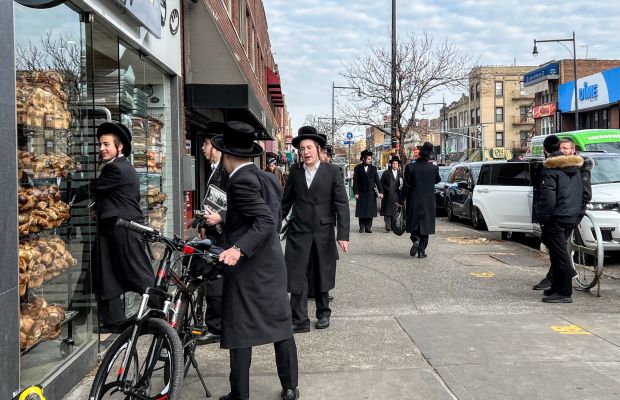


Living in North Williamsburg, I’ve learned more about the Hasidic Jews residing in South Williamsburg. From McCarran Park to the Williamsburg Bridge, the streets are bustling with diversity, but on the other side of the bridge it’s an entirely different world. This Hasidic Jewish community is one of the most strictly observant in the world. Below is what I’ve seen, heard and experienced first hand.
Look up when you are entering the community. There will be a wire suspended between street lights and telephone polls, but it’s not for electrical purposes. You can usually follow it down to just a knot. This perimeter creates an eruv, or a symbolic enclosure.
The eruv transforms the public streets into a private space on Shabbat, which is Friday night to sundown on Saturday. It’s made for the purpose of allowing activities like being able to carry things or use strollers. A single break in any part of the line voids that symbolic space so a rabbi does daily checks to make sure everything is in tact.
Though many do not consider this the modern way of practicing the Sabbath, these ultra-orthodox Hasidic Jews have to pause on all chores, shopping, cleaning, and cooking, anything creative or strenuous, and they can’t use electricity.
The first unique sight in South Williamsburg is the baby cages. These look like prison bars with a ledge on most building windows. South Williamsburg has the highest birthrates in the country, with eight children on average. The baby cages are an opportunity for the kids to get some fresh air.
Jewish couples typically marry in their late teens and have a family right away. My friend explained his experience: he met his future wife at 19 years old in his grandmothers house. It was the first time he was allowed to look at or speak to a female that wasn’t in his family. They were given half an hour to get to know each other, under the watchful eye of both families. Weeks later, the two were married. They had five children in the first six years. It was never a choice.
South Williamsburg has its own school system. You will see the distinctive yellow buses with Hebrew writing. It encompasses the largest yeshiva school in the world, the United Talmudical Academy Torah Vyirah, which has 2,600 students with separate buildings for the boys and girls.
Satmar children are taught Yiddish, Hebrew and English as a third language. Despite living in New York City, they do not prioritize English. They are mandated to teach secular subjects until they are 16. Beyond that it’s almost entirely religion. They are also not encouraged to pursue a higher education in a field which might produce conflict with the Torah.
Hasidic Jews are not wealthy. The ones that do well, add it to the community pot so that they can maintain the neighborhood homes, synagogues, stores and separate legal/police systems.
Men can’t look at other women that are not in the family. Everything is divided among the sexes. The men spend most of their time together at synagogues, work and feasts presented by the Rabbi. Men have more freedom.
Life is centered around religion and family. Hasidic Jews are not allowed to have internet, watch tv or listen to music that is not religious or instrumental. They can have cell phones but safegaurds are placed on the phones so that they don’t have access to the internet. You’ll see lots of flip phones walking through the neighborhood.
Men wear long black coats, dark pants and tall black hats. On the Sabbath they switch to a streimel which is the large circular fur hat. Women wear modest shirts, skirts and dresses that fall below the knee. Bright colors aren’t allowed.
Satmar Jews always have peyes, the curled earlocks that grow after 2 years old. When women get married, they are forced to shave their hair. In addition, hair must be covered anytime in public – usually by a wig, or a sheitel. The South Williamsburg community is so strict, that they don’t allow real hair wigs, and instead are only allowed short synthetic wigs and often have to pair with a hat.
Why do Hasidic Jews stay in the community? My Hasidic friend said that they don’t know anything else and are taught that if they do anything against the Torah, they will be condemned to hell. It’s fear that keeps them from the outside world.
My friend doesn’t agree with the religion or limitation. It wasn’t until he wanted to learn more about the religion, that he discovered what the community was keeping from him. He now lives a double life – keeping up with appearances in his community, and slicking back his hair and wearing jeans for the first time when he can sneak out at night. He won’t leave because of his children but he does this at the risk of being excommunicated. His most heart wrenching story involved his 7 year old son, who pushed the elevator button in their apartment building on the Sabbath. His son lied in bed sobbing after because he “knew he was going to hell” and his family couldn’t comfort him or tell him otherwise.
Despite this, some people in South Williamsburg will claim that people outside the community have been brainwashed. The Hasidic Jews are the lucky ones. They live a simple life, devoted to family and religion. We are the ones with the complicated lives.
As Hasidic Jews are forbidden from reading the newspaper or watching the news, Covid-19 was not something the community was educated on. There was a serious outbreak in the area after some large weddings and prayer services continued. No one wore masks, before or after the outbreak.
It’s an interesting walk through the neighborhood. If you would like to speak to someone, I recommend stopping at Williamsburg Bagel or Oneg Bakery, considered some of the best bagels and pastries in NYC. As always, please be respectful.
